Coming in from the cold
by Karin Salvalaggio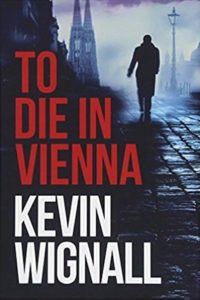
“Echoes of The Third Man, as well as Hitchcock.” The Sunday Times
My father earned one of the highest security clearances attainable in the US Air Force. The true nature of his work was kept secret from myself, my siblings and my mother. In hindsight, it must have been difficult to come home in the evenings unable to discuss the events of the day. There must have been times when he was stressed by things he learned on the job, yet he carried the burden in silence. The absence of clarity was difficult at times. My friends knew what their parents did for a living, yet my father spent his days in a secret world I couldn’t come close to imagining. When pressed, I told people he fixed jeeps, which made sense as he was quite handy with tools. The truth, when it finally came out, was far more interesting. My father worked in military surveillance for the Air Force Technical Applications Center throughout much of the Cold War. Using seismic, hydroacoustic, and satellite detection systems, it is the sole organisation in US federal government whose mission is to detect and report technical data from foreign nuclear explosions. Notably, much of the data that was obtained following the accident at the Chernobyl Nuclear Power Plant in 1986 came through my father’s organisation.
With hindsight, there were some clues as to where my father’s interests lay. He was, after all, an avid consumer of Cold War espionage thrillers. He and my mother went to the library once a week, bringing back a pile of books each. His books detailed the adventures of spies negotiating the bleak landscapes of the Eastern Bloc but my mother, having grown up in Pakistan, favoured colourful tales of the Raj. I read everything that was discarded, whether it was age appropriate or not. I developed a fondness for spy novels despite their austere qualities. The landscapes felt hostile and abandoned, and the protagonists were often out of their depth and isolated. I sensed loneliness and despair in those books, as if the chill that had descended on the world during that era permeated the pages. In retrospect, reading spy novels whilst living on military bases may not have been a great idea as it heightened the paranoia I was feeling at the time. We had emergency ‘duck and cover’ drills in our classrooms, uniformed soldiers carrying automatic rifles patrolled the streets, and fighter jets regularly flew overhead. The threat of mutually assured nuclear destruction wasn’t some far-fetched abstraction. I never expected to reach adulthood.
Freddie Makin isn’t your ordinary hero and Kevin Wignall isn’t your ordinary writer.”
On the advice of a well-meaning school guidance counsellor, I moved directly from this rather intense environment to one that existed in the opposite extreme. Following high school graduation, I attended the University of California Santa Cruz, one of the most liberal institutions in the United States. It was a bit of a culture shock. Gone were the firearms, fighter jets, and omnipresent American flags, and in came tofu, alternative lifestyles, and the ubiquitous peace signs. Needless to say, spy novels and authors celebrating Britain’s colonial past were rather frowned upon. Though the experience opened my eyes to new ways of thinking and living, I couldn’t fully shed my military upbringing. I’ve never been comfortable with disorder and woolly political thinking. For all the good my new liberal friends wanted to achieve, I couldn’t help thinking that someone has to pay for all this, someone has to protect you.
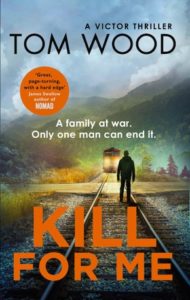
“Terrifically fun and explosively propulsive.” Gregg Hurwitz
I’ve recently rekindled my interest in spy novels. It started off innocently enough. Kevin Wignall’s existential thriller To Die in Vienna fell into my hands at a pre-Christmas drinks event. I read it a few days later. There is something rather special about this book. Freddie Makin isn’t your ordinary hero and Kevin Wignall isn’t your ordinary writer. When the book opens, Freddie is a freelance surveillance expert with an unresolved past who’s living in near-obscurity in Vienna, having been assigned by his company to spy on a Chinese academic named Jiang Cheng for unnamed clients. Given he speaks no Mandarin, Freddie is an unlikely man for the job, but he dutifully films and records every one of Cheng’s actions. Over time Freddie builds a relationship with a man he will never meet, describing his ‘clockwork universe’ with delicacy and admiration. It does, of course, go horribly and violently wrong and Freddie is once again forced to confront the realities of his chosen profession. Wignall’s writing is superb. A heady mix of the mundane and the extraordinary adds credibility to the storyline. Freddie’s actions and reactions never fall into the trap of tropes and instead branch off into the surreal. Freddie follows a road not often taken by spies. Instead of fleeing Vienna, he chooses to hide in plain sight, even going so far as to stay in a hotel called The Madhouse. In doing so, he comes to know and love a city that he’d only ever inhabited in the shadows. Over time and with the help an unlikely band of strangers, Freddie finds a reason to live and a new way of living. Now he just has to survive.
A reader may expect few named female characters with a decent role, but the evil cartel queen Heloise and her nemesis at the Drug Enforcement Agency Joanna Alamaeda are given plenty of time to stretch their wings.”
The second thriller to make its way onto my desk was far more hardcore. Written by a deceptively polite Englishman named Tom Wood, Kill For Me is the eighth in a series of novels charting the adventures of a ruthless contract killer named Victor. Victor’s spycraft is off the charts and he rarely puts a foot wrong as he plans out his assignments with deadly precision. No longer in the employ of the CIA and MI6, he’s taken an assignment in Guatemala City where a de facto war has broken out between two sisters fighting for control of their deceased father’s vast drug cartel. Victor has been hired by the pleasingly evil Heloise Salvatierra to kill her younger sister Maria. Though Victor isn’t concerned with the morality of the situation, he does live by a code. He will not hesitate to kill you if you cross him. There will be no second chances. Needless to say, the storyline is at times brutal. The action opens on a Guatemalan beach on the border of Honduras where Victor is in the midst of negotiating a deal to buy a very big gun from a small-time arms dealer named Jairo. The agreed price is $100,000, cash. It soon becomes clear that Victor is being set up. Jairo is panicking but Victor takes it in his stride as he’s come to expect betrayal. Six well-armed Marxist guerrillas keen on killing Victor and taking his money soon emerge from behind the dunes. It’s not exactly a spoiler to say that it doesn’t end well for the Marxists – or Jairo for that matter. To give Victor credit, he did try to reason with them. Then, “When reason was exhausted and emotion failed there was one final card to play. Violence.” Given the high levels of testosterone involved in much of the action, a reader may expect there to be few named female characters with a decent role, but happily this isn’t the case. The evil cartel queen Heloise and her nemesis at the Drug Enforcement Agency Joanna Alamaeda are given plenty of time to stretch their wings. They are women who will stop at nothing to get what they want.
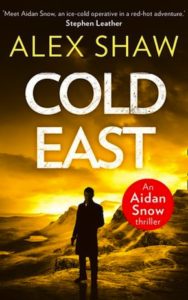
“Sizzles across the page like a flame on a short fuse!” Matt Hilton
Alex Shaw’s Cold East was the third spy novel I read in as many weeks. Shaw’s offering is far more international in scope, involving intelligence agencies and locations in the Ukraine, Russia, the United States, Turkey, Great Britain, and Afghanistan. An ex-Red Army soldier in Afghanistan, long assumed dead, delivers some chilling news. A portable nuclear device hidden since the breakdown of the Soviet Union has fallen into the hands of an Al-Qaeda cell and is on its way to Europe. MI6 and the CIA will have to work together to stop the unfolding catastrophe. Shaw writes with a great deal of technical detail, giving the work credibility and much-needed plausibility. This is acronym-rich prose that would give any episode of Line of Duty a run for its money. Agencies are named, processes explained, and prisoners interrogated by the FBI, CIA and MI6 to name but a few of the parties involved. There is rarely time to take a breath. Following an opening scene in the Ukraine where MI6 operative Aidan Snow rescues a British national held by Russian insurgents, you’re immediately set down in the middle of a terrorist attack in a shopping mall in New Jersey. From there the action races from an Al-Qaeda cell on the move to ‘penal colony No. 6’ in Russia where a Chechen terrorist awaits his chance to escape, and on to a Turkish bloodbath. Given the wealth of locations, characters, agencies, and competing agendas, it is no small feat that Shaw manages to keep all the threads running seamlessly.
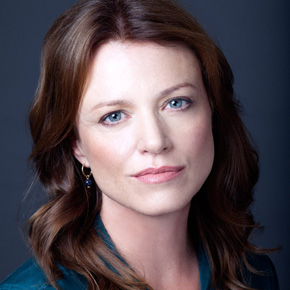 Karin Salvalaggio is the author of the Macy Greeley crime novels Bone Dust White, Burnt River, Walleye Junction and Silent Rain and a contributing editor at Bookanista. Her fiction to date is set in towns that border the Montana wilderness, a uniquely spectacular landscape she fell in love with as a child. Her proudly independent characters inhabit stories about the American dream gone wrong. She is currently working on the final edits of a psychological thriller set closer to home in West London, where she has lived since 1994. The characters may be hemmed in by glass and steel, but the stories they tell are just as compelling.
Karin Salvalaggio is the author of the Macy Greeley crime novels Bone Dust White, Burnt River, Walleye Junction and Silent Rain and a contributing editor at Bookanista. Her fiction to date is set in towns that border the Montana wilderness, a uniquely spectacular landscape she fell in love with as a child. Her proudly independent characters inhabit stories about the American dream gone wrong. She is currently working on the final edits of a psychological thriller set closer to home in West London, where she has lived since 1994. The characters may be hemmed in by glass and steel, but the stories they tell are just as compelling.
karinsalvalaggio.com
@KarinSalvala
@karinsalvalaggio
Kevin Wignall spent many years as an army child in different parts of Europe, and went on to study politics and international relations at Lancaster University. He became a full-time writer after the publication of his first book, People Die (2001). His other novels include The Hunter’s Prayer (2004), the film adaptation of which, directed by Jonathan Mostow and starring Sam Worthington and Odeya Rush, was released in 2017. To Die in Vienna (Thomas & Mercer, Kindle, Brilliance Audio) has been optioned by Focus Features, with Jake Gyllenhaal slated to produce and star as Freddie Makin.
Read more
kevinwignall.com
@kevin_wignall
Tom Wood was born in Burton-on-Trent and now lives in London. After a stint as freelance editor and filmmaker, he completed his first novel, The Hunter (2011), which was an instant bestseller and introduced readers to his antihero Victor, an assassin with a purely logical view on life whose morals are deeply questionable. Kill For Me is published in paperback, eBook and audio download by Sphere/Hachette Audio.
Read more
tomwoodbooks.com
@TheTomWood
Alex Shaw spent the second half of the 1990s in Kyiv, Ukraine, teaching Drama and running his own business consultancy before being headhunted for a division of Siemens. The next few years saw him doing business for the company across the former USSR, the Middle East, and Africa, and he now divides his time between homes in Kyiv, Worthing and Doha, Qatar. He is an active member of International Thriller Writers and the Crime Writers’ Association. His bestselling Aidan Snow SAS thrillers Cold Blood, Cold Black and Cold East are published by HQ in paperback and eBook.
Read more
alexwshaw.co.uk
@alexshawhetman
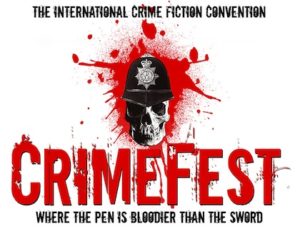 Kevin Wignall, Tom Wood and Alex Shaw are among over 150 writers taking part in Crimefest 2019 at the Mercure Bristol Grand Hotel, Broad Street, Bristol, from Thursday 9 to Sunday 12 May.
Kevin Wignall, Tom Wood and Alex Shaw are among over 150 writers taking part in Crimefest 2019 at the Mercure Bristol Grand Hotel, Broad Street, Bristol, from Thursday 9 to Sunday 12 May.
More info
@CrimeFest

